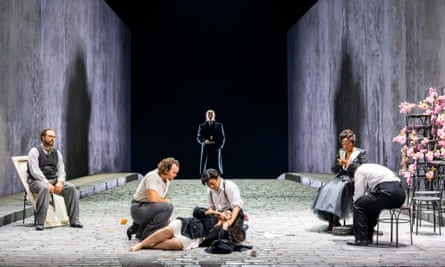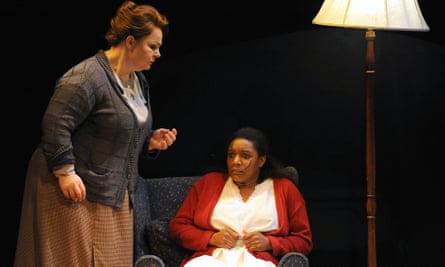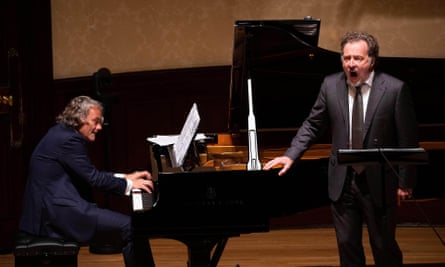For the first 10 months of 2022, it seemed that British musical life was returning to some kind of normality. But that was to reckon without the decisions of the one organisation in this country whose sole reason for existence is to nurture and encourage the arts throughout England.
It was generally accepted that there would be cuts when Arts Council England announced its next round of funding, but no one could have imagined that those cuts would be imposed in such an arbitrary and, in some cases, seemingly spiteful way. The root-and-branch destruction of English National Opera has inevitably attracted most attention – the suggestion the company might move to Manchester was quickly seen as the red herring it so obviously was, while the justifications offered by Arts Council apparatchiks have been specious. But however shocked anyone was by the decision, they can hardly have been surprised.
If ENO is to be preserved in any form it has to begin with a clean slate, with an entirely new administration and board of directors.
ENO has been financially incontinent for some years now; for a while the sheer quality and range of what it was putting on stage saved it from the axe, but the steady decline in quality and number of performances in recent seasons has meant that its continued existence had become increasingly hard to justify. Those who have been campaigning so vigorously for the funding to be restored are surely remembering the company as it once was, and not as it has become. If ENO is to be preserved in any form in the near future it has to begin with a clean slate, with an entirely new administration and board of directors.
But some of ACE’s other decisions seem much more illogical and even harder to justify. The removal of funding from Britten Sinfonia, the only orchestra that regularly gives concerts in East Anglia, is perhaps the most egregious and, like the removal of grants to the Glyndebourne autumn tour and for Welsh National Opera’s touring dates in England, seems to fly in the face of the declared intention of decentralising arts provision. And when the Britten Sinfonia decision is seen alongside the similar axing of the Manchester-based ensemble Psappha, and the substantial reductions in grants to both the London Sinfonietta and Sound and Music, it seems as if ACE has determined that going forward it will be the musical mainstream, what’s safe and what’s popular, that will be encouraged rather than anything more experimental. The rich mix of events around the country that has been restored so remarkably over the last 12 months may sadly prove to be short-lived.
Turning to my highlights of 2022, a day devoted to the works of one of my favourite composers was always going to rank highly, but the outstanding performances in the BBC Symphony Orchestra’s Total Immersion: Sibelius the Storyteller made it even more special. Every piece in the two orchestral programmes that Sakari Oramo conducted had been meticulously prepared, but the highlight was the astonishing intensity of the performance of one of Sibelius’s greatest achievements, Luonnotar, with Anu Komsi the soaring, impassioned soloist.
There are clear links between Sibelius’s orchestral writing and approach to form and that of Anna Thorvaldsdottir, and her two orchestral works that received British premieres this year were a reminder of how distinctive her music can be. The CBSO’s British premiere of Catamorphosis revealed a wonderfully sustained 20-minute musical arch full of beautifully crafted detail, while at the Proms the BBC Philharmonic introduced ARCHORA, another demonstration of the sureness of Thorvaldsdottir’s handling of the orchestra. Andrew Clements
Erica Jeal: A brilliantly creepy Bohème and a magnificent Grimes

Glyndebourne’s staging, by Floris Visser, of Puccini’s La Bohème. Photograph: Tristram Kenton/The Guardian
The two most memorable musical experiences of 2022 for me have been in the opera house. The show I probably enjoyed most – and yes, I enjoy silently sobbing in a theatre while being shamelessly manipulated by music, thank you Puccini – was Glyndebourne’s new staging of La Bohème, a really tight production in which the director, Floris Visser, took an idea that seemed dubious on paper – having a creepy personification of Death stalking the doomed Mimì throughout – and emboldened a young cast to make it work brilliantly. And although I can’t remember a performance of Britten’s Peter Grimes that didn’t leave me poleaxed, I found Deborah Warner’s Royal Opera staging exceptionally powerful, not least because of the unsparing performance of Allan Clayton in the title role. Mark Elder – in, unbelievably, his first time conducting this opera in a UK theatre – drew some magnificent playing and singing from the ROH orchestra and chorus. Erica Jeal
Flora Willson: ‘A staggering quality of collective music-making against the odds’

Conductor Keri-Lynn Wilson with Anna Fedorova and Liudmyla Monastyrska at the end the performance by Ukrainian Freedom Orchestra at the BBC Proms. Photograph: Mark Allan/BBC/PA
Months later, two performances are still ringing in my ears. In May, Jeremy Denk played Book 1 of Bach’s monumental Well Tempered Clavier with no music, no ceremony, no shy reverence. It was exhilarating, even transformative. And in a last-minute addition to the BBC Proms season, the Ukrainian Freedom Orchestra gave its second ever performance 158 days into the Russian invasion. I remain haunted by the staggering quality of collective music-making against the odds that day. Closer to home, it was a relief to look away from multiple, standout shows of amateurism among British politicians to watch untrained, under-confident singers flourish on SkyArts’ Anyone Can Sing. And yes, it turns out anyone can – at least with the help of the show’s vocal coaches. Their responses to “the nation’s vocally challenged” were a masterclass in hyper-professional compassion; the results yet more proof of music education’s potential to change lives. Flora Willson
Rian Evans: Keyboard giants and whirlytubes
Two keyboard giants – Elizabeth Leonskaja and Stephen Hough – stand out for recitals that will long resonate in the memory: Leonskaja’s for her indomitable character and a sense of Beethoven being recreated as he’d heard it in his aural imagination; Hough’s for power-housing through Liszt’s Dante Sonata, its infernal drive balanced by cantabile elegance.

Eliska Weissova as Kostelnicka Buryjovka and Elizabeth Llewellyn as Jenůfa in Welsh National Opera’s production of Janacek’s Jenůfa directed by Eloise Lally. Photograph: Robbie Jack/Corbis/Getty Images
Welsh National Opera’s performances of Janáček, under conductor Tomáš Hanus, were also very special: Elizabeth Llewellyn’s Jenůfa tugging at the heart-strings and Ángeles Biancas Gulin giving the role of Emilia Marty the full diva treatment in The Makropulos Affair. Fie on ACE. By contrast, some sounds were memorably unexpected: whirlytubes in Brett Dean’s cantata In This Brief Moment; Popping Candy – in the packet and as micro-explosions on the tongues of Uproar’s players – in Guto Pryderi Puw’s piece of that name; and bodies as percussion instruments with Graham Fitkin and Ruth Wall performing Slow Wac, a witty Fitkin antidote to his newer Bla Bla Bla, questioning how we listen, what we hear and what we ignore at our peril. Rian Evans
Tim Ashley: ‘Absolute perfection from start to finish’
2022 was a year in which many companies and organisations returned to strength after the disruptions and tragedies of Covid, and both the Proms and Glyndebourne presented their first full seasons since 2019. The Proms included a formidable Mahler Seven from Kirill Petrenko and the Berlin Philharmonic, and powerhouse Liszt from Yuja Wang and the Oslo Philharmonic under Klaus Mäkelä.
No concert this year gave me greater pleasure than the Ulster Orchestra’s immaculately performed Prom
Yet no concert this year gave me greater pleasure than the Ulster Orchestra’s Prom with their chief conductor Daniele Rustioni, a beautifully prepared programme of Wagner, Strauss, Mahler and Schumann, immaculately performed. Glyndebourne, meanwhile, struck gold with a revival of Mariame Clément’s staging of Donizetti’s Don Pasquale, superbly conducted by Ben Glassberg and featuring a truly great ensemble cast led by Erin Morley as Norina and Huw Montague Rendall as Malatesta. The operatic highlight of the year, as far as I was concerned, it was absolute perfection from start to finish.
Martin Kettle: ‘No artist touched the soul more deeply and more often’

Christian Gerhaher (right) and Gerold Huber perform at the Wigmore Hall in 2020. Photograph: David Parry/PA
No artist touched the soul more deeply and more often than the German baritone Christian Gerhaher. I heard him five times in 2022, all at the Wigmore Hall. Three recitals were devoted to Hugo Wolf, bringing peerless vocal illumination to this highly varied repertoire. The most recent, reunited with his regular accompanist Gerold Huber, was a hair-raising account of Schubert’s Schwanengesang cycle. But the most extraordinary was Gerhaher’s appearance at a private memorial concert for Bernard Haitink, at which his singing of Mahler’s Ich bin der Welt abhanden gekommen touched levels of vocal artistry that are exceptionally rare. Almost in the same league, though, was Christoph Prégardien’s exemplary recital with Julius Drake in Middle Temple Hall last month, Wolf again, along with Schumann’s Dichterliebe. And, finally, amid many operatic highlights, none matched the blistering intensity of Longborough festival opera’s Korngold’s Die Tote Stadt, in which Rachel Nicholls was truly sensational.
END






